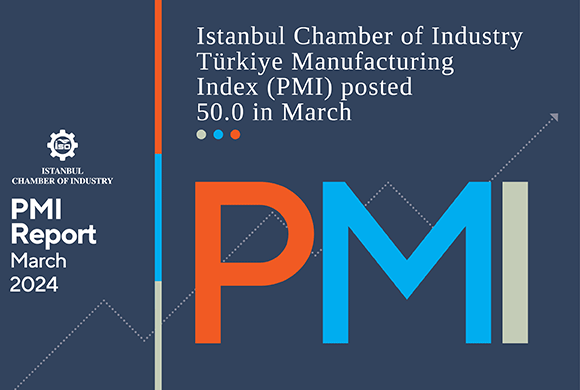News
ICI Released March 2024 ICI Türkiye Manufacturing PMI and Türkiye Sector PMI Report
- 01.04.2024
- News

The headline PMI posted at the 50.0 no-change mark in March, ticking down slightly from a reading of 50.2 in February, signalling overall stable business conditions during the month. Output ticked higher, while new orders and employment neared stabilisation. New orders softened to the least extent in nine months. Input buying increases for second month running. Rates of inflation softened but remained elevated. Weakness of the Turkish Lira against the US dollar was again a key factor pushing up input prices.
According to the results of the Istanbul Chamber of Industry Türkiye Sector PMI Report, among the monitored sectors, only the food products sector increased its new orders. The number of sectors increasing their output in March was three, down from four in February. The sharpest drop in output was recorded in textile sector, while the sharpest rise was in land and sea vehicles sector. This stability in output was mostly due to the slowing new orders in all sectors except for food products. The number of sectors increasing their staffing levels in March dropped to two, for the first time since May 2020.
The March 2024 period of Istanbul Chamber of Industry (ISO) Türkiye Manufacturing PMI (Purchasing Managers’ Index) survey, which is the fastest and reliable reference accepted in manufacturing industry performance of the economic growth was announced. According to the results of the survey where any figure greater than 50.0 indicates overall improvement of the sector, the headline PMI posted neutral 50.0 mark in March, slightly down from a reading of 50.2 in February.
The stability in the health of the sector reflected little change in the main components of the headline index. Manufacturing production increased fractionally in March, while new orders and employment eased marginally but neared stabilisation. New orders softened to the least extent in nine months. With this relative improvement in the demand environment encouraging some firms to expand production and increase purchasing activity.
SELLING PRICES ROSE AT THE SOFTEST PACE IN THREE MONTHS
The respective increases in output and input buying were the second in as many months, with the rate of expansion in purchasing more marked than that seen in February. Inventories continued to moderate, however, with stocks of both purchases and finished goods scaled back at the end of the first quarter. Some firms experienced delays in receiving inputs as a result of disruption in the Red Sea, with lead times lengthening for the third month running.
Weakness of the Turkish Lira against the US dollar was again a key factor pushing up input prices, while some firms also reported rising raw material costs. The rate of input cost inflation remained sharp, but eased to a three-month low. Selling prices also rose at the softest pace in three months during March, but the rate of inflation remained marked and was sharper than the series average.
Commenting on the Istanbul Chamber of Industry Türkiye Manufacturing PMI survey data, Andrew Harker, Economics Director at S&P Global Market Intelligence, said: “March was a month of stability for Turkish manufacturers. New orders continued the recent move towards stabilisation and this improving picture prompted further modest increases in output and purchasing. If the recent trend in demand continues we should hopefully see growth building momentum as we go through the second quarter of the year.”
NEW ORDERS SOFTENED
Türkiye Manufacturing PMI survey signalled an overall softening in new orders mainly based on the continued stabilisation in demand in March. New orders rose in food products only, while most of the sectors saw declines in output. Employment also expanded marginally in March. The prices on the other hand continued to rise, with the highest inflation being in land and sea vehicles sector.
SHARPEST DECLINE IN OUTPUT IN TEXTILE
The number of the monitored sectors increasing their output in March was three down from four in February. Even in these sectors, growth remained moderate and only the food products sector achieved a significant expansion. The sharpest drop in output was recorded in textile sector. This stability in output was mostly due to the slowing new orders in all sectors except for food products. The sharpest decline in new orders was again in textile products as in output. A relatively more positive atmosphere was observed in export markets. Three sectors increased their new orders from abroad. The number of sectors increasing their staffing levels in March dropped to two, for the first time since May 2020. Only the food products and the machinery and metal products sectors increased their staffing levels.
Input costs continued to increase sharply, but at a softer pace in most of the sectors compared to February. The lowest increase in input prices was seen in clothing and leather products, while the sharpest rise was in land and sea vehicles sector.
Similarly, the fastest increase in finished goods prices was measured in the land and sea vehicles sector. However, the rate of inflation here eased down in March as it was the case for most of the sectors. Prices of finished goods moderated the most in electrical and electronic products and the chemical, plastic and rubber products sectors.
LEAD TIMES SHORTENED IN FOUR SECTORS
Supply chains had a mixed overview in March. Lead times shortened in four sectors, with a record high improvement in supplier performance of the wooden and paper products sector. The other six sectors lengthened their lead times. Due to the overall stable demand conditions, only three sectors managed to increase their purchasing activities in March. Similarly, input stocks scaled back in general with only the food products and the machinery and metal products sectors rose their inventories.
*You can find attached the Istanbul Chamber of Industry Türkiye Manufacturing PMI and Sector PMI March 2024 reports.